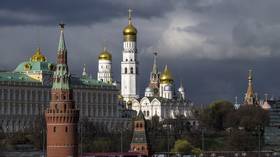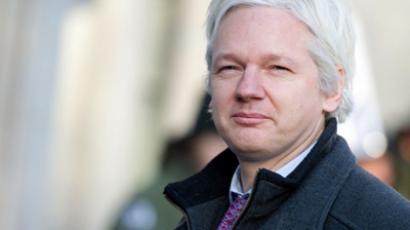Assange rejects police request to surrender
WikiLeaks founder Julian Assange has said that he rejects the British police’s request to hand himself in and will remain in the Ecuadorean embassy and continue his appeal for asylum on grounds of political persecution.
Earlier on Thursday, police issued an order for Assange to appear at a police station to begin the extradition process.
The letter from the Metropolitan Police sent to the Ecuadorian Embassy said it "requires him to attend a police station at a date and time of our choosing. This is standard practice in extradition cases and is the first step in the removal process."
Assange refused to surrender telling BBC: "Our advice is that asylum law both internationally and domestically takes precedence over extradition law, so almost certainly not."
The whistleblower is currently liable for arrest by the UK police should he leave the embassy on the basis that he violated his bail conditions. He arrived at the Ecuadorian Embassy last Tuesday, appealing for Asylum from the country’s government. Assange hopes to sidestep his removal to Sweden where he is wanted for questioning over allegations of sexual abuse.He has voiced fears that Stockholm may turn him over to US jurisdiction where he could be tried on charges of espionage. The publishing of thousands of diplomatic wires on the Wikileaks site prompted a wave of aggressive rhetoric from US politicians branding the whistleblower as a terrorist.The Ecuadorian government has said that it is no hurry to reach a conclusion over Assange’s appeal. President Rafael Correa stressed his government was considering the legal and political consequences of granting asylum and that it had not set a deadline for the decision. He has recalled the UK ambassador to Ecuador to assess the situation."We will come to a decision as a sovereign nation which doesn't exclude the possibility of consulting with friendly nations," said the president on Tuesday. The reason it is taking Ecuador so long to decide is because apart from letters and petitions from activists it is receiving a list of ultimatums and threats from the United States, Sibel Edmonds, the founder of the National Security Whistleblowers Coalition, told RT. “The State Department is giving Ecuador plenty to think about by showing what kind of consequences they will be facing, whether it’s economical, whether it’s political.”Julian Assange said that he sought protection from the Ecuadorian government because he had been abandoned by Canberra. The Australian government disputes this, arguing that they are powerless to intervene as he has broken no Australian laws.Asssange has maintained throughout the drawn-out trial that the allegations set against him are depthless and politically-motivated














